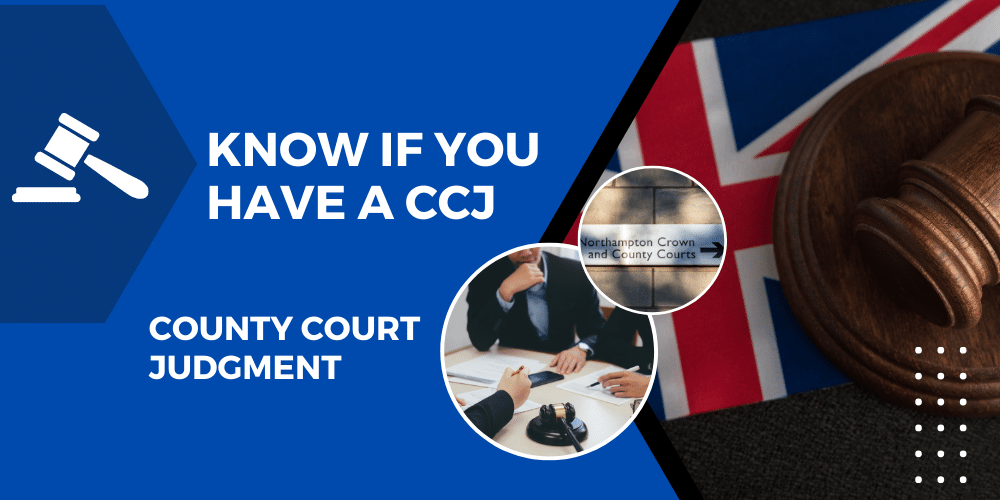Are you worried about whether you might have a County Court Judgment (CCJ) against you? Don’t fret! It’s essential to know where you stand financially, and checking for a CCJ is a crucial part of that. In this guide, we’ll walk you through the steps on
how to find out if you have a CCJ against your name.
What is a CCJ?
First things first, let’s understand what a CCJ is. A County Court Judgment (CCJ) is a court order in England, Wales, and Northern Ireland that can be issued against you if you fail to repay money you owe. It’s a serious matter and can affect your credit score and ability to borrow money in the future.
How to Find If You Have a CCJ
- Check Your Credit Report: One of the easiest ways to find out if you have a CCJ is by checking your credit report. You can request a copy of your credit report from any of the major credit reference agencies such as Experian, Equifax, or TransUnion. Your credit report will show if there are any CCJs registered against you.
- How Do I Know If I Have a CCJ? Look for any entries related to County Court Judgments on your credit report. It will usually include details such as the amount owed, the name of the creditor, and the date the judgment was issued.
- Use the Government’s Online Service: The government provides an online service called ‘Find a court judgment’ where you can search for CCJs against yourself or someone else. You’ll need to know your name and address details to use this service.
- How to See If You Have a CCJ? Simply visit the government’s website and enter your details as required. The service will then display any CCJs registered against you.
- Check Your Mail: If you have moved house or changed address recently, it’s possible that any correspondence regarding a CCJ may have been sent to your old address. Keep an eye out for any letters from courts or creditors, as they may contain important information about a CCJ against you.
- How Can I Check If Someone Has a CCJ? If you’re concerned about someone else having a CCJ, you can use the same methods mentioned above to search for judgments against them.
- Contact the County Court: If you’re still unsure whether you have a CCJ against you after checking your credit report and using the government’s online service, you can contact the County Court directly. They will be able to provide you with information on any judgments registered against your name.
- How Do You Check If You Have a CCJ? Calling or emailing the County Court and providing them with your details is a straightforward way to find out if there are any CCJs against you.
- You can get a FREE copy of your credit report from a credit reference agency to see if you have a CCJ against you.
What to Do If You Have a CCJ
If you discover that you do have a CCJ against you, don’t panic! There are steps you can take to deal with it:
- Pay the Debt: If you can afford to do so, paying off the debt in full will mark the CCJ as ‘satisfied’ on your credit report, which is better for your credit score than having an unsatisfied CCJ.
- Negotiate a Payment Plan: If paying the full amount is not possible, you can contact the creditor to negotiate a repayment plan. They may be willing to accept smaller monthly payments until the debt is cleared.
- Apply for a Set Aside: In certain circumstances, you may be able to apply to have the CCJ ‘set aside’ if you believe it was issued unfairly or if you were unaware of the judgment against you.
Remember, it’s crucial to stay on top of your finances and regularly check your credit report to avoid any unpleasant surprises like CCJs. By following these simple steps, you can quickly find out if you have a CCJ against you and take appropriate action to deal with it.
How long does a ccj stay on your credit file
A County Court Judgment (CCJ) typically stays on your credit file for six years from the date of the judgment. This duration is regulated by credit reporting agencies and is a standard practice in the United Kingdom. Here’s a breakdown of how the timeline usually works:
- Six-Year Reporting Period: The CCJ will be visible on your credit file for a period of six years. This starts from the date the judgment was issued, regardless of whether you pay the judgment amount in full during that time.
- Satisfied vs. Unsatisfied CCJs: If you satisfy the CCJ by paying the full amount within 30 days of the judgment, it will be marked as “satisfied” on your credit file. While this is still visible to potential lenders, it may be viewed more favorably than an unsatisfied CCJ. However, whether satisfied or unsatisfied, the CCJ remains on your file for the full six years.
- After Six Years: Once the six-year period has passed, the CCJ should automatically be removed from your credit file. It’s important to note that this removal is automatic, and you don’t need to take any specific action to have the CCJ removed after the six-year period.
- Impact on Credit Score: The presence of a CCJ on your credit file can have a negative impact on your credit score, making it more challenging to obtain credit during the six-year period. However, as time passes and you demonstrate responsible financial behavior, the impact of the CCJ on your credit score may gradually diminish.
How to get a ccj removed
Getting a County Court Judgment (CCJ) removed from your credit file is not a straightforward process, and it’s generally challenging. However, there are a few steps you can take to try to improve your situation:
- Satisfy the CCJ:
- If you haven’t already, ensure that you satisfy the CCJ by paying the full amount owed. This doesn’t remove the CCJ from your credit file, but it changes its status to “satisfied,” which can be viewed more favorably by lenders.
- Wait for the Six-Year Period:
- CCJs automatically stay on your credit file for six years from the date of judgment. Once this period elapses, the CCJ should be removed from your credit report automatically. You don’t need to take any specific action for this to happen.
- Apply for a Certificate of Satisfaction:
- If you’ve satisfied the CCJ, you can apply to the court for a Certificate of Satisfaction. This document confirms that you’ve paid the judgment in full. While having this certificate doesn’t remove the CCJ from your credit file, it can be useful in proving to lenders that the debt has been settled.
- Set Aside the CCJ:
- In exceptional circumstances, you may be able to apply to the court to have the CCJ “set aside” if you believe it was issued unfairly or if you were unaware of the judgment. This is not a guaranteed process, and you’ll need valid reasons for the court to consider setting aside the judgment.
- Dispute Inaccuracies:
- If there are inaccuracies in the information related to the CCJ on your credit file, you can dispute these inaccuracies with the credit reference agencies. If the information is found to be incorrect, it may be amended or removed.
- Seek Professional Advice:
- If you’re unsure about the best course of action or if you’re facing difficulties, consider seeking professional advice from a financial advisor or credit repair agency. They may be able to provide guidance based on your specific situation.
‘s important to note that removing a CCJ before the six-year period is a challenging process, and success is not guaranteed. Demonstrating responsible financial behavior, such as maintaining good credit habits and settling outstanding debts, can, however, positively impact your creditworthiness over time.
Always keep an eye on your credit report, and if you have concerns or questions about the information on it, contact the credit reference agencies for clarification.
-
I am a passionate content writer, weaving words with fervor and flair. With each sentence, I strive to captivate minds and stir emotions. Dedicated to the art of storytelling, my pen dances across the page, creating narratives that resonate and leave a lasting impact. In the realm of content, my passion is the driving force behind every piece I craft."
View all posts




